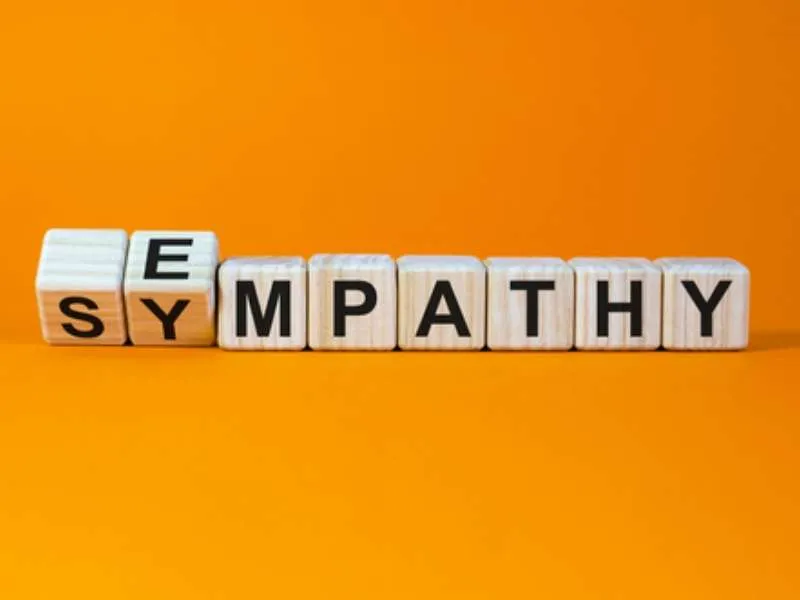In a world that seems more divided than ever, the concept of radical empathy has the power to bridge the gaps between individuals and foster a sense of understanding and compassion. But what exactly does radical empathy mean?
At its core, radical empathy is the practice of stepping into someone else’s shoes and truly understanding their thoughts, feelings, and experiences. It goes beyond sympathy or surface-level understanding and instead requires a deep level of emotional connection and openness.
By cultivating radical empathy, we can create a more connected and harmonious world where compassion and understanding prevail.
Understanding the meaning of radical empathy
Radical empathy, as the term suggests, is about going beyond the ordinary levels of empathy. It involves immersing ourselves in the experiences of others to truly understand their perspectives and emotions. It requires us to set aside our own biases, beliefs, and judgments and instead approach situations with an open mind and heart.
Radical empathy is not about agreeing with or condoning someone’s actions or beliefs but rather about seeking to understand the underlying reasons behind them. It is about recognizing the shared humanity in all individuals and acknowledging that their experiences and struggles are valid.
The importance of cultivating compassion and understanding
In a world that is increasingly polarized and divided, cultivating compassion and understanding is more important than ever. When we practice radical empathy, we create an environment where people feel heard, valued, and understood. This can lead to greater trust, stronger relationships, and more effective communication.
Compassion and understanding also foster a sense of unity and cooperation, allowing us to work together towards common goals and find solutions to complex problems. Additionally, cultivating empathy can have a positive impact on our own well-being, as research has shown that acts of kindness and compassion can boost our own happiness and reduce stress.
The benefits of practicing radical empathy
Practicing radical empathy not only benefits individuals but also has a wider impact on society as a whole. When we approach others with genuine empathy, we are more likely to find common ground and build bridges of understanding. This can lead to reduced conflict, increased collaboration, and the ability to find creative solutions to complex problems.
Radical empathy also fosters a sense of belonging and inclusivity, as it allows individuals to feel seen and valued for who they truly are. It promotes a culture of respect and acceptance where diversity is celebrated and differences are seen as opportunities for growth and learning.
Steps to practice radical empathy in everyday life
Cultivating radical empathy requires conscious effort and practice. Here are some steps you can take to incorporate radical empathy into your everyday life:
Listen actively: When engaging in conversations, make a conscious effort to truly listen to the other person without interrupting or formulating your response. Pay attention to their words, body language, and emotions to gain a deeper understanding of their perspective.
Seek to understand: Instead of jumping to conclusions or making assumptions, ask open-ended questions to encourage the other person to share more about their experiences and beliefs. Be genuinely curious and willing to learn from their unique perspective.
Practice perspective-taking: Put yourself in the other person’s shoes and imagine how their experiences and circumstances might shape their thoughts and actions. This can help you develop a more empathetic understanding of their motivations and challenges.
Validate emotions: Empathy involves acknowledging and validating the emotions of others, even if you don’t necessarily agree with their actions or opinions. Let them know that their feelings are heard and understood, which can help foster a sense of trust and safety.
Practice self-reflection: Take the time to reflect on your own biases, beliefs, and assumptions. Consider how they might influence your interactions with others, and challenge yourself to see things from different perspectives.
Cultivate gratitude: Cultivating a sense of gratitude can help foster empathy by reminding us of the interconnectedness of all beings. Take a moment each day to reflect on the things you appreciate about others and the world around you.
Overcoming challenges in cultivating your skills
While practicing radical empathy can be immensely rewarding, it is not without its challenges. One of the biggest obstacles is the inherent human tendency to judge and categorize others based on our own beliefs and experiences. Overcoming this challenge requires a willingness to challenge our own assumptions and be open to perspectives that may differ from our own.
It also requires patience and resilience, as cultivating empathy is an ongoing process that requires practice and self-reflection.
Another challenge in cultivating this concept is the fear of vulnerability. Truly understanding someone else’s experiences requires us to be open and vulnerable ourselves, which can be uncomfortable.
However, it is through this vulnerability that deep connections and understanding can be formed. By embracing vulnerability and creating a safe space for open and honest communication, we can overcome this challenge and foster a culture of radical empathy.
Radical empathy in personal relationships
It is essential for the development of deep and lasting connections that we, in our personal interactions, put into practice radical empathy. It entails giving our loved ones our undivided attention, comprehending their requirements and aspirations, and sticking by them without judgment.
Through the practice of radical empathy, we are able to establish a secure environment in which we are able to speak in an open and honest manner. By doing this we can better foster trust and closeness.
Additionally, it enables us to negotiate disagreements and conflicts with compassion and understanding. This ultimately results in relationships that are healthier and more meaningful.
Radical empathy in professional settings
The benefits of radical empathy extend beyond personal relationships and can also have a significant impact in professional settings.
When leaders and colleagues practice this concept, it creates a culture of inclusivity, respect, and collaboration. This leads to increased employee satisfaction, improved teamwork, and higher productivity. Radical empathy also enhances problem-solving and decision-making processes, as it allows for a diversity of perspectives to be considered and valued.
Examples of radical empathy in action
There are many facets of life in which one might spot examples of radical empathy in action. One such example is the Restorative Justice movement. This movement seeks to address issues of injury and conflict by bringing together:
- Those who have been harmed (victims)
- People who have caused harm (offenders)
- Society at large
The goal is to create solutions that put an emphasis on understanding and healing (community).
Another illustration of this may be seen in the work of social activists, who, rather than merely responding to the symptoms of societal problems, actively seek to comprehend and address the underlying causes of these problems. These people are actively working toward the goal of destroying oppressive structures and establishing a society that is more egalitarian and just.
The impact in a divided world
Radical empathy has the potential to heal wounds and transcend gaps in a world that frequently appears to be split along the lines of race, religion, politics, and other factors. It enables us to acknowledge our common humanity and locate areas of agreement, despite the profound disparities that exist between us.
By putting it into practice, we may dismantle boundaries, question preconceived notions, and cultivate a sense of belonging and connection with others. This has the potential to build a society that is more harmonious, more welcoming, and more inclusive, where the voices of everyone are heard and cherished.
Resources for further exploration
If you’re interested in learning more about radical empathy and how to cultivate it in your own life, here are some resources to explore:
- Book: “Empathy: Why It Matters, and How to Get It” by Roman Krznaric
- TED Talk: “The Power of Vulnerability” by Brené Brown
- Online Course: “Developing Emotional Intelligence” by Coursera
These resources can provide further insights and practical strategies for cultivating radical empathy in your personal and professional life.
Conclusion: Embracing radical empathy for a more connected world
In a world that often feels divided and disconnected, radical empathy offers a powerful solution. By cultivating compassion and understanding, we can bridge the gaps between individuals and foster a sense of unity and belonging. Practicing radical empathy requires effort and self-reflection, but the benefits are immense. It not only improves our personal relationships and professional interactions but also has the potential to create a more harmonious and compassionate society. So let us embrace it and work together towards a more connected world.
Practice radical empathy today and see the positive impact it can have on your relationships and the world around you. Start by listening actively, seeking to understand, and practicing self-reflection. Together, we can create a more compassionate and understanding world.
Related article:




No comments! Be the first commenter?